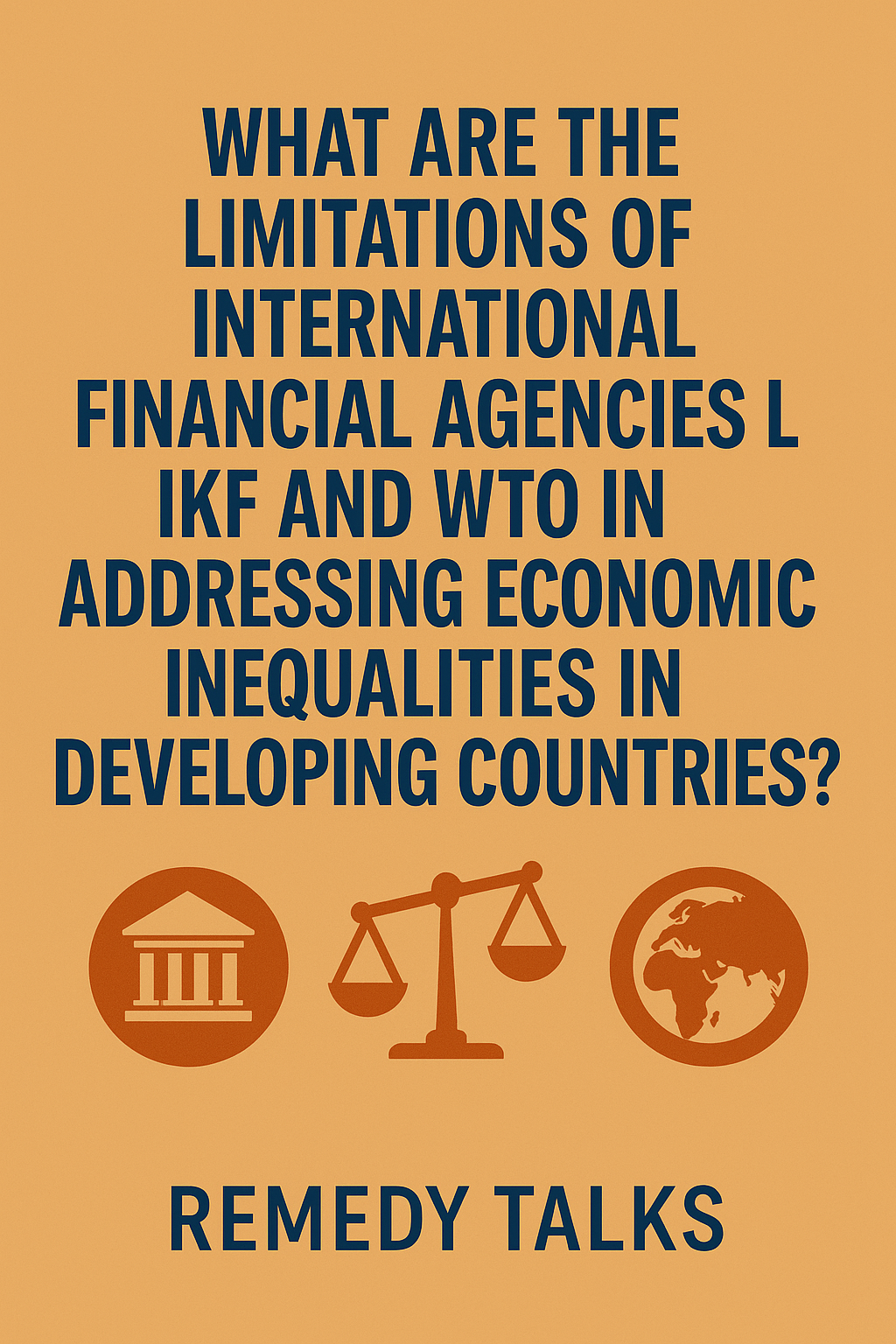What the IMF and WTO Can’t Fix: The Struggle Against Inequality in Developing Countries
International financial institutions like the International Monetary Fund (IMF) and the World Trade Organization (WTO) are often presented as global safety nets—designed to stabilize economies, promote trade, and reduce poverty. But for many developing countries, these institutions feel more like tightropes than safety nets. They come with conditions, restrictions, and expectations that often make it harder—not easier—to overcome deep-rooted economic inequality.
So what are the real limitations of the IMF and WTO, and why do they struggle to address economic disparities in the Global South?
The Myth of Neutrality
On paper, the IMF and WTO are neutral global organizations. But in practice, their policies often reflect the interests of powerful, wealthy nations. For example, voting power at the IMF is based on financial contributions. That means the United States and European countries hold disproportionate influence over lending decisions.
This imbalance isn’t just technical—it’s political. When crisis hits a low-income country, the loans that follow often come with harsh conditions. Governments are told to cut spending, open up markets, and privatize state assets. These might sound like modern economic prescriptions, but for struggling nations, they often mean:
- Fewer public services
- Job losses
- Cuts in healthcare and education
- Increased reliance on foreign imports
That’s not a recipe for long-term development—it’s a cycle of dependency.
One Formula, Many Failures
The IMF’s famous “structural adjustment programs” were introduced with the aim of stabilizing economies and encouraging growth. But instead of creating opportunity, they often undermined local industries and widened the gap between rich and poor.
Countries like Tanzania, Bolivia, and Nigeria followed IMF prescriptions to the letter. What they got in return was economic contraction, rising unemployment, and increased poverty. Meanwhile, essential services like water, electricity, and public transportation were handed over to private companies that prioritized profits over people.
It raises a troubling question: Whose development are these institutions really serving?
Trade Rules That Don’t Play Fair
The WTO is supposed to be a global referee, ensuring that countries play by the same trade rules. But in reality, the playing field is anything but level.
Developed nations continue to heavily subsidize their own agriculture and industries, while pressuring developing countries to remove tariffs and open markets. This puts local farmers and small businesses in the Global South at a crushing disadvantage. They simply can’t compete with the prices of imported goods dumped into their markets by wealthier nations.
And when developing countries try to protect their industries, they face accusations of protectionism—even though richer nations do the same under different names.
Ignoring the Human Factor
One of the biggest blind spots in the IMF and WTO’s approach is the near-exclusive focus on macroeconomic indicators. They track GDP growth, inflation, and trade volume—but rarely account for real human outcomes.
How many children dropped out of school due to budget cuts?
How many people lost access to healthcare after privatization?
How did income inequality shift after a country opened its markets?
These are questions that rarely make it into policy discussions, yet they define the lived experience of millions in developing nations.
Crisis Response: Too Little, Too Late
During the COVID-19 pandemic, the weaknesses of these institutions were exposed even further. While the IMF announced emergency lending facilities, many low-income countries found themselves burdened with even more debt. The WTO, meanwhile, failed to ensure equitable vaccine distribution as rich countries secured most of the global supply.
These failures aren’t just technical—they’re moral. When the world’s poorest are left behind during a global emergency, the promise of “international cooperation” starts to sound hollow.
The Challenge of Reform
To their credit, both the IMF and WTO have acknowledged the need for change. The IMF has recently spoken about “inclusive growth,” and the WTO has launched initiatives to support small economies and reduce trade barriers for least developed countries.
But talk is cheap. Real reform means shifting power, listening to voices from the Global South, and letting go of outdated economic dogma. It means understanding that development isn’t just about open markets and budget surpluses—it’s about people.
Moving Toward a Fairer Global Economy
What would a fairer system look like?
- Debt cancellation for countries trapped in endless repayment cycles
- Flexible policy options, rather than rigid austerity mandates
- Trade rules that protect local industries, especially in agriculture and manufacturing
- Decision-making power shared equally, not concentrated in the hands of the wealthy
- Programs aligned with real human development, not just economic metrics
None of this is radical. It’s simply what justice and dignity demand.
Final Thoughts
The IMF and WTO were built with a vision of global cooperation. But unless that cooperation becomes genuinely inclusive, these institutions will continue to fail the people who need them most.
Economic inequality isn’t just a technical problem—it’s a human one. And solving it requires more than financial tools. It requires empathy, accountability, and a new way of thinking about development—one that puts people before profits, and justice before convenience.
Author:
Remedy Talks Editorial Team
Helping you make sense of global economics, one issue at a time.
